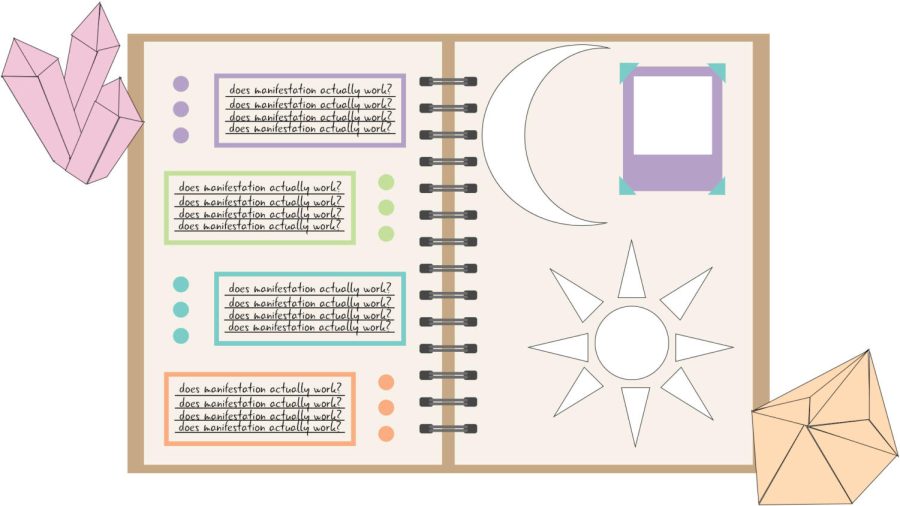The truth behind manifestation
Graphic Illustration by Emma Cionca
One form of manifestation is repeated phrase, often written in a journal like the one above.
April 21, 2021
From psychics to Ouija boards, people have always been captivated by unknown spiritual powers. Some believe in the higher power of the universe, one aspect of which is manifestation. Recently, quarantine boredom and social media trends have sparked a renewed interest in manifestation and its supposed benefits.
Manifestation generally involves the idea of creating better outcomes for oneself by simply believing the universe will bring about the desired future. Commonly associated with manifestation is the Law of Attraction — a mindset or belief that states that positive thoughts bring positive results into a person’s life, while negative thoughts bring negative outcomes. The term “Law of Attraction” first appeared in 1877, in a book written by the Russian occultist Helena Blavatsky. The interest in this idea carried into the 20th century, with books and movies being written and filmed about it. “The Secret,” written by Rhonda Byrne and released in 2006, is one of the best known documentary movies regarding the Law of Attraction.
The Law of Attraction has several principles, including the concepts that similars attract, life has limited space for negativity and staying in the present is important. These principles apply to all areas of life, including health, finances, relationships and more; however, there is no scientific evidence to support it.
The methods of practice for manifestation and the Law of Attraction have progressed as beliefs have changed, but two recurring principles are repeated actions and positive behavior. Examples of repeated actions are different forms of journaling, as well as creating mood boards, meant to repeat the idea of one’s goals until they come to fruition. Manifestation is known for bringing positive energy into one’s life, so practicing acceptance and positivity are critical.
The recent rise in interest in manifestation has been partially caused by quarantines around the world and the prevalence of social media.
“I have tried [manifestation] over quarantine last year, but I haven’t committed to it,” said sophomore Sarah Sun. “I’ve been into crystals for a long time though, but started looking into their ‘properties’ a few months ago. I don’t take them too seriously but I like their energy or vibe.”
The peak of popularity was around July 2020, as Google search trends show that searches for the word “manifestation” were most common during that time. Social media sites, such as TikTok, have also developed their own trends surrounding manifestation. Creators ending videos with phrases such as “Like this video for your wish to come true” are a common sight on the app, as large groups of users take part in “claiming” the video’s message in the comment section. Even audios with certain frequencies, such as the “Love Frequency” at 528 Hz, were developed to assist in manifesting love. Tarot card and crystal readings are also popular on the app. Every card or crystal has a different meaning to it and creators do readings using these mediums, asking their viewers to “take what resonates and leave what doesn’t.”
The manifestation trends have also brought a wave of controversy. Because some have profited off of manifestation through methods such as filming videos or starting classes on how to manifest, its credibility is undermined. One aspect that is important to examine is the dangers the idea of manifestation can pose to people with mental disorders. Manifestation is about believing in the power of one’s mind to bring positive change; however, individuals with mental disorders, particularly anxiety, tend to have consistently negative thoughts. Critics argue that obsessing over the power of one’s mind may lead to a large focus on already present negative thoughts, which can further worsen a person’s mental health.
Credibility issues aside, certain aspects of manifestation can bring positive change into one’s life on their own. Manifestation places a large emphasis on training oneself to think positively and constructively, which often leads to improvements in morale and effort. Rather than “the universe” bringing positive change into their life, they do it themselves simply by changing their lifestyle to a more positive one. Identifying problematic behaviors is a valuable skill to have, as it leads to self-improvement.
“I do find myself being more aware of negative thoughts and stopping myself from thinking that way to ‘prevent negative energy,’” said Sun. “I wouldn’t count on manifestation too much because actions or what you do also really matters, but the combination of taking action and positive thinking could definitely help.”
Some argue that this whole situation is being taken too seriously and all the people “manifesting” over social media are aware it does not truly work. Whether manifestation actually works or not is up to one’s own personal judgement, and, as long as it is practiced properly and in a sincere way for each individual, manifestation can have benefits in people’s daily lives.



































































